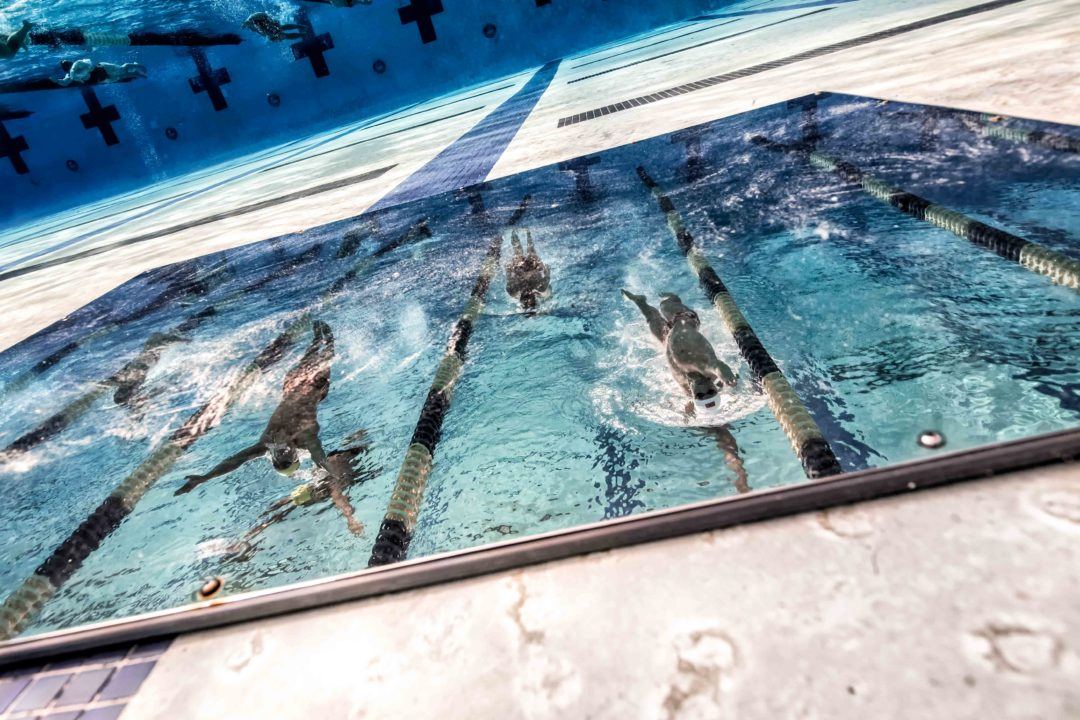Courtesy: Elizabeth Wickham
When parents are researching teams for their kids, there are many factors to consider. One is location, the coaches, if the team’s goals and objectives match their swimmer’s — and also the size of the team. Teams come in all sizes and types from small club teams under 200 swimmers to nationally recognized teams with 1,000 swimmers. What’s right for your family?
I believe it’s all about your swimmer’s desires and objectives and what is a good fit. Plus, the coach’s knowledge, ability to communicate and be a role model can be crucial regardless the size of a team.
Here are benefits of a small team:
Your swimmer will know everyone on the team, from the youngers to the seniors.
The coach will know your child personally and may customize individualized workouts and tapers.
Your swimmers will get recognized by the team for their swimming achievements regardless of age and level.
Here are a few disadvantages one may encounter on a small team:
More ages and abilities may be combined, like early teens with 17- and 18-year-old swimmers.
The team may have a harder time financially.
If your swimmer goes to a national level meet they may be the only swimmer, or one of a few, representing their team.
Here are some benefits to being on a large team:
There will be more swimmers attending national level meets, which means travel meets for swimmers with their peers.
Every day in the pool may be more competitive with more kids pushing each other during practice.
There’s excitement when your team gains national recognition for the accomplishments of swimmers and coaches.
Here are a few drawbacks of large teams:
Swimmers may get lost in the crowd and coaches may not have time to give individualized attention.
There may not be the bond of a small team where all the swimmers know each other, their siblings and parents.
Your child may be in crowded lanes with 10 kids rather than having a lane with one or two swimmers.
What other pros and cons do you see on small and large teams?
 Elizabeth Wickham volunteered for 14 years on her kids’ club team as board member, fundraiser, newsletter editor and “Mrs. meet manager.” She’s a writer with a bachelor of arts degree in editorial journalism from the University of Washington with a long career in public relations, marketing and advertising. Her stories have appeared in newspapers and magazines including the Los Angeles Times, Orange County Parenting and Ladybug. You can read more parenting tips on her blog: http://bleuwater.me/.
Elizabeth Wickham volunteered for 14 years on her kids’ club team as board member, fundraiser, newsletter editor and “Mrs. meet manager.” She’s a writer with a bachelor of arts degree in editorial journalism from the University of Washington with a long career in public relations, marketing and advertising. Her stories have appeared in newspapers and magazines including the Los Angeles Times, Orange County Parenting and Ladybug. You can read more parenting tips on her blog: http://bleuwater.me/.

My swimmer was on a small team and the more individualized time spent definitely made a long term impact and nurtured her love of swimming. Still repeats mantras her group coach taught six years ago when facing both challenges and celebrations in the sport. However, she was training with people 4 to 6 years older in age group therefore lane was kind but not her friends really. Due to work relocation Now in a large club and has socially appropriate peers that are all equally skilled and serious about the sport, lots of friends. Coaches at both clubs are quality but, like in all things there are tradeoffs. I think this is a very individualized decision and both have their… Read more »
I used to be on a small team and was 12 training with seniors. My mom was not a fan.
This is why I love medium-sized teams the best 🙂
Large team does not mean it could not have small-group size and close relationship, It kind of is the best of both worlds when a large team has adequate coaching staff and enough lanes!